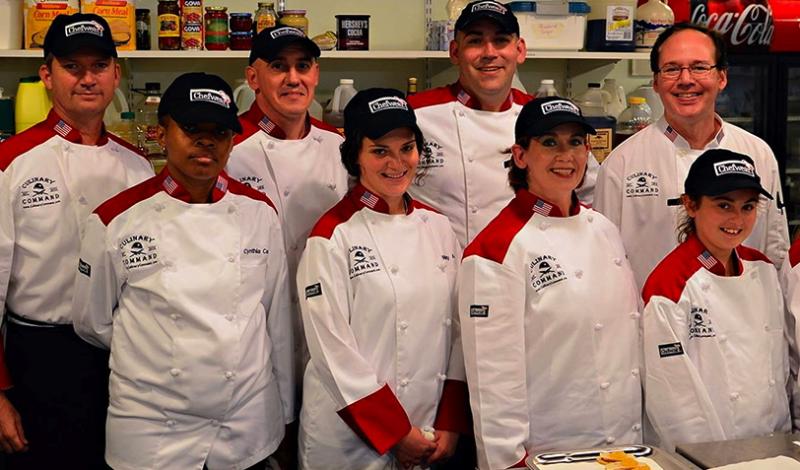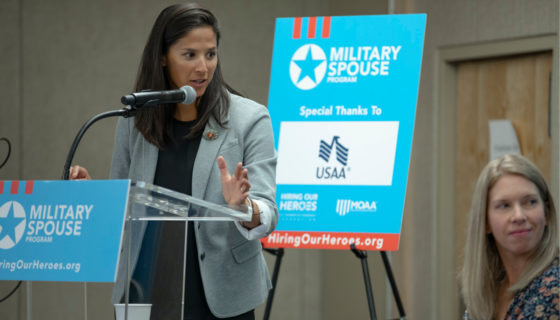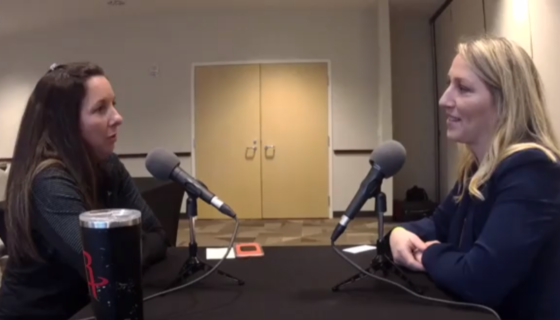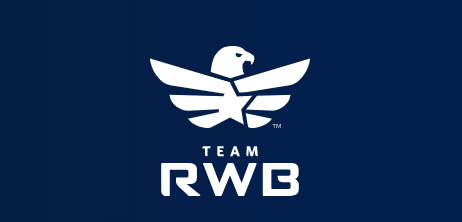How One Man Helps Vets Sharpen Their Culinary Skills

 This story first appeared on Freeenterprise.com.
This story first appeared on Freeenterprise.com.
Professional Chef David James Robinson had always wanted to do something to help veterans, who face so many obstacles when they returned from active duty. One day when he was thinking about the problem, he made a connection that would allow him to do that.
“It just dawned on me that a lot of the attributes of the kitchen were very similar to military training,” recounts Robinson. “It’s, ‘Yes, chef. No, chef.’ We wear uniforms, and we use teamwork. While what we do isn’t life and death, there’s definitely a certain mental and physical stamina required. I thought that, instead of sitting in a cubical, these folks could work in hospitality, restaurants, hotels, and food service.”
That realization led Robinson to develop a curriculum that would ultimately serve as the model for Culinary Command. Robinson founded Culinary Command in 2010 to help train veterans as well as active military members for careers in the culinary arts—without charging them a penny.
Headquartered in Syracuse, New York, Culinary Command offers an average of two programs annually, each of which accepts roughly nine vets. Participants are immersed in the culinary world over the course of the 45-day training course, Robinson says, and begin by learning basic knife skills before moving on to increasingly advanced techniques.
Though still relatively young, the six-week course has already produced a number of successful graduates, says Robinson, a longtime chef who moonlights as the program’s instructor. He is able to offer the program completely free of charge thanks to the partnerships he has developed with major organizations like the Steven & Alexandra Cohen Foundation.
During a recent interview with Free Enterprise, Chef David discussed the work he’s doing, what fueled his desire to help veterans, and his plans for the future.
What got you interested in helping veterans?
I ran my own business, where I was an executive chef, and I kept hearing about the plight of returning veterans and how they were having trouble with assimilating. The thing that really struck me about that was the suicide rate—that 22 veterans commit suicide every day. That really struck me, and I thought, ‘Boy, we’ve really got to do something about this because it’s such a squandered resource.’ I mean these people have no hope. I kept hearing that they were having trouble assimilating into civilian jobs, and it was causing a lot of frustration, and I knew I wanted to do something to help solve what is a very serious societal problem.
Can you talk about the curriculum and what you cover?
We started in 2010. We took about two years to create the curriculum, and the curriculum was based on a video series called “Learn How to Cook (and eat your mistakes),” which was a 15-hour video series we created. We took the recipes from that and from there we developed a curriculum for the veterans.
It’s usually 45 days, so it’s about six weeks, and it gives them the ability to focus solely on learning all about food and service and beverage. It really does become a retreat for them.
We start from the very basics even though sometimes we have people with experience in the culinary arts. We begin with how to hold a knife, and we go through technique by technique. We cover topics like poaching, grilling, braising, broiling, smoking, and stewing. That’s how we build the curriculum one day at a time. We also spend about 14 to 16 hours each day working, so we really replicate the professional kitchen. We go to bed really tired at the end of the day.
How do you recruit veterans?
We always reach out to vet centers, as well as employment, rehabilitation, and homeless shelters. We’re looking for all kinds of veterans, and to that end we have a very interesting cross-section. We serve active military members, so every program we usually have one or two participants who are still active but are looking to transition to the culinary world after they’re out. We’ve also been really lucky in that national news organizations have helped us get the word out.
Where do your students come from?
People fly from all over to attend the program at our headquarters in Syracuse, New York. We’ve also had veterans from across the world; one of our former students was stationed on a military base in Pisa, Italy, for example.
Have you considered expanding the program?
We’ve had a lot of interest from people and organizations, but all of this is based on funding. There are a lot of requirements that go along with setting up a teaching kitchen, so the cost sometimes is a little prohibitive for some of the other veteran organizations. We’ll fly anybody anywhere, though, and we pay for the airfare. But if somebody came to us and had the funding, we’d definitely be interested in doing it in other states.
What types of candidates are you searching for?
We look for seriousness of intent—it’s not a hobby or recreational program. And while it’s worthy for people to want to cook better meals for their families, we’re really looking to put people in employment and jobs.
About one-third of our graduates have gone on to the Culinary Institute of America or advanced training, so it’s a pretty serious program. It’s too intense and demanding for someone who just wants to be a better home cook. So that’s the pivotal question for candidates: What do you want to do with the training once you’re finished with it?
What’s your hope for veterans who graduate the program?
We don’t judge whether someone wants to take further training or not. We have all kinds of graduations. We have people who run food trucks. We have a guy who has his own barbecue business and creates his own sauces. We have a guy who couldn’t hold down a job, and now he’s the executive chef for TD Garden, where he does all the cooking for the executive skyboxes at Celtics and Bruins games. We also have someone who runs her own catering company.
Sometimes our veterans have an entrepreneurial spirit, and they leave us and open their own businesses. Other times, they have businesses but they don’t have the skills and they want to develop them so their businesses will succeed. The ultimate goal, though, is for them to retool and train for civilian careers in food, hospitality, restaurants, and hotels.
What’s the best part of the job for you?
The whole experience is just amazing. We’ve had people who, after the six weeks, go out and get their very first job. It’s just tremendous, and it makes me so proud of them and all of the hard work they’ve put in.



